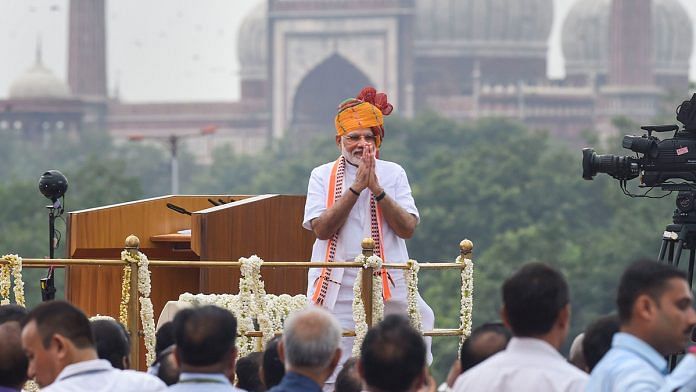New Delhi: PM Narendra Modi’s I-Day speech Thursday was big on “nudge” as he sought to send out a message for population control and against plastic pollution.
Those who have chosen to have small families were hailed by Modi as patriots as he tried to drive home the point that a population explosion threatened the balance of resources in India.
An appeal to understand the importance of birth control followed.
He also requested people to shun plastic for greener alternatives.
“During my 2014 speech, I spoke about cleanliness. It became a movement in the country,” Modi said, adding, “Today, I have another request. By 2 October, the birth anniversary of Dear Bapu (Mahatma Gandhi), I want to urge citizens to give up single-use plastic… Shopkeepers should sell jute and cloth bags.”
“Customers,” he added, “should adopt ways to reduce plastic usage”. “We must also use technology to abolish plastic usage,” said the Prime Minister.
Both these pieces of advice are examples of the nudge theory, which encourages a “nudge” in the right direction instead of bans and diktats to effect social change.
The theory is credited with the success of the Modi government’s Swachh Bharat Abhiyan as well as Beti Bachao Beti Padhao campaign. In the Economic Survey released earlier this year, chief economic adviser K.V. Subramanian dedicated an entire chapter to behavioural economics, calling for a “nudge unit” at NITI Aayog.
Also read: ‘Nudge’ gets new push as NITI Aayog seeks behavioural economists to reform policy making
A boost for tourism
Modi’s speech Thursday was the first of his current term and his sixth as the Prime Minister. As has been the pattern with him, it was equal parts report card and roadmap as Modi hailed some of his government’s initiatives, like the abrogation of Article 370, and laid out the agenda for the years ahead.
“From 2014-19 (Modi’s first term) was the time to fulfil the people’s needs, and the period starting from 2019 is for the realisation of their aspirations,” Modi said.
His aim, he reiterated, was to ensure minimum government in people’s lives — “na Sarkar ka dabaav, na sarkar ka abhaav (neither pressure from the government nor a vacuum)”— and focus on their “ease of living”.
Among other things, he requested Indians to take their families to at least 15 places within the country by 2022, when India marks 75 years of Independence, to boost tourism. He urged people to visit even those places where hotels and other infrastructure were yet to come up, saying their trips would help create better facilities.
He also weighed in on the rising aspirations of the common Indian — while people would earlier get enthusiastic about just a plan to build a railway station, they now expected optimum service too, Modi claimed.
“Now they ask, when will Vande Bharat Express come to our area? Earlier, the common man aspired for a good mobile phone, but now he talks about data speed. Times are changing and we have to accept it,” he said. “Now is the time to think about the India of the 21st century and how the dreams of the people will be fulfilled. We are following a plan to fulfil the aspirations of new India.”
Within the first 10 weeks of its second term, Modi added, his government has pulled off a series of achievements — nullification of Article 370 and 35A, enactment of a law to criminalise triple talaq, strengthening of anti-terrorist legislation, including the UAPA, among others.
Noting that the abrogation of Article 370 had made “one nation, one Constitution” a reality, he also made a fresh pitch for “one nation, one election”, for simultaneous elections to the Lok Sabha and state assemblies.
Also read: ‘Nudge’ is the secret behind success of Modi’s pet projects, says Economic Survey




Swach Bharat a success? Walk out on any street in India and see how quickly you come across open trash or sewer? My guess is within 1 mns.
Swatchh Bharat a success! That’s not completely true. But anyway, he initiated it.
Good that people learnt the habit of cleanliness. Population control and plastic ban is must as both have become menace.
I hope people learn to take false claims with a pinch of salt.
Strict population control measures should have been initiated long time ago. India is over-populated by 10-times. It is good that PM has initiated the discussion on population control. One hopes that Govt comes out with a package of incentives and disincentives to encourage limiting family size to not more than two children. However, what is regrettable is that the media which wants to comment on all issues, has maintained studied silence over the past five decades out of fear of being branded “communal”by the leftist-socialist-libreralist mafia.It is already seen that some compulsive contrarians have started opposing the PM’s call by quoting all kinds of absurd researches by unknown foreigners. This is again the case of leftist/socialists not being in touch with public opinion, who firmly believe that population control is the dire need of the day.
Very inspiring speech.
Notable for pretty much ignoring Terroristan.